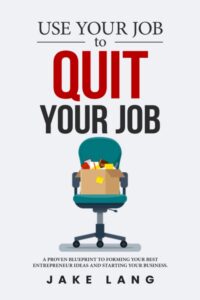
This is a very neat book, and I’m extremely grateful that it didn’t exist 10 years ago when I decided to start a side hustle.
Why? With the help of Use Your Job to Quit Your Job, I would have probably succeeded with some IT-related enterprise, because I had worked in IT back then. However, I SO much prefer being a writer and business coach 😛
As Jake Lang, the author of the book, said:
The process outlined in this chapter is nearly foolproof; it has worked for me and my eight businesses, and it has worked for thousands of other entrepreneurs who have gone through the process(…)”
He meant in that fragment the process of estimating a baseline market size, but it applies to the whole Jake’s framework. It works. It bears the proof of practice – it worked for thousands. It is nearly foolproof.
Which doesn’t change the fact that the pesky me has found a few minor
CONs
And traditionally, I will start from them. Overall, the book is great, but there are some misconceptions and some statements too definitive to be valid.
1. Coaching.
Simply put, coaching is the process of getting paid to help someone.”
Nope. That’s overly simple. If you clean a bathroom and are getting paid for that, you are helping someone – aaaand that’s NOT coaching. However, in the next paragraph, Jake clarified with a much better description of the coaching process:
(…) the client is responsible for sitting down and doing the work; you simply act as a sounding board and guiding voice.”
That’s much closer to what coaching is.
2. The Purpose of Business.
The author states:
The purpose of a business is to make money.”
Jake got it very backward. He mistook the symptoms and the end effect. Saying that the purpose of business is to make money is like saying that the purpose of the human existence is to breathe, or to pump blood through one’s veins, or to drink, or eat.
None of the above are purposes. They are prerequisites. You need to breathe, your bloodstream must be in constant action, you need hydration and nutrition to function. Otherwise, you will die.
BUT!
It’s not your purpose. And the same is with your business. Of course, you need a cash flow to have a business. But its purpose is usually much higher than that. Maybe it’s your family, or personal freedom, or it is the vehicle you use to change the world for the better. I even know businesses which purpose is to share the Gospel!
Making money? Pshaw!
To Jake’s defense, he said further in the book:
The purpose of a business is to make money, so that’s what you should do: start selling right away.”
That’s closer to reality. Starting selling right away is like giving a spank to a newborn – so he starts sucking air, so he can breathe. If you neglect this, a newborn may suffocate, and sadly, have no purpose on this realm.
Start selling right away, and your business will start breathing. It may aim for the higher purpose; but first, you need to keep it alive.
3. Transitioning Out of Your Day Job.
Sooner or later, following the Use Your Job to Quit Your Job framework, you will be able to say farewell to your day job. Here comes a piece of unfortunate advice:
Talk to your employer first.”
It’s not the worse advice in the world, but it assumes one thing: that your boss, or the company you work for, is decent. Jake probably had a great deal of luck in his life and worked only for decent people.
But there are companies out there you don’t want to give a warning shot. Sadly, they are common enough to make Jake’s advice conditional.
I say, always use your best judgement. I worked for several different companies, and I approached my transition differently with each of them. Your gut feeling will tell you whether or not to talk to your employer first, or if you simply give them a notice in the last possible moment.
I have no love for crappy employers. Your contract has a two-week notice period?!? Well, nobody prevented them from amending the contract with a 1-month or 1-year notice period. It’s their headache, not yours.
OK, enough of CONs. I’m the first to admit they are minor. They don’t negatively affect the main purpose of the book: using your day job to quit it altogether. Jake Lang’s book is full of good stuff, and here it comes.
PROs
1. Stories, Stories, Stories.
There are a zillion stories in Use Your Job to Quit Your Job, and that is a good thing. First of all, I hate the how-to books filled with questions and exercises but without any context. How do you even know you are doing them properly? It is just “do this, do that!” Thanks to the stories illustrating each phase of the process, it is obvious how you should go about specific exercises.
But this is just a minor advantage. The main benefit of many, many, many (did you get the point?) stories included in the book is that it’s easy to think that you can do it. Inspiration and a boost of self-confidence is something every person who wants to transit from employee to entrepreneur desperately needs.
You read Use Your Job to Quit Your Job and all the stories there, and you get the feeling that this is actually doable – for YOU. Yes, you can figure out what business to start. Yes, you can validate the idea. Yes, you can do the research.
Yes, you can quit your day job.

And you don’t need to become a guru or dance on TikTok to do this. Your skills and experience is enough to win you freedom.
2. Framework, Framework, Framework.
From my experience and observation, the longer you are stuck in a cubicle, the lower is your creativity and entrepreneurship (and life satisfaction!). Thus, providing the exact step-by-step framework for the whole process is essential.
I can get paralyzed by analysis, forever. I can self-doubt myself to the oblivion:
Is it a good idea?”
But what if…?”
Should I do this or that?”
Thanks to Jake’s guidance, you can go over the whole process, from even thinking about quitting your day job to actually giving the notice. No second guessing. Minimal self-doubt. You have the exact process to follow. And it works. It worked for thousands of individuals who used their day job to quit their day job.
3. Mindset, Mindset, Mindset.
I love the main premise of this book: you need to make a living with your side hustle, which will eventually turn into the main hustle. So, you don’t have to start another Facebook, Tesla, Air B&B, whatever. You need to make about $50,000 a year.
Not $100k, not $1M, not a billion. Just fifty grand a year.
You don’t have to be uber-successful and drive a Ferrari. You don’t have to impress the whole world on social media with your mansion.
It makes the whole endeavor so much more doable – in your mind. And your mind is where everything happens.
Whether you think you can, or you think you can’t – you’re right.” – Henry Ford
I loved this mindset and approach. It turns off the internal critic and self-doubts. It is simply doable, let’s start.
If you can make $50k a year with your side hustle, you can certainly grow it to a bigger scale when it becomes your main hustle.
You don’t have to stay stuck at the $50k level, but this figure makes a perfect starting point. In the age of Internet hype, it is a refreshingly down-to-earth approach.
Those are the main PROs. There are others too – the book is well done, writing is engaging, I love the personal tidbits of Jake’s journey.
The Missing Element
However, this book lacks one piece: what if you hate what you are doing? Then, just the thought of doing more of what you are doing in your day job makes your stomach turn! You definitely don’t want to be miserable outside your employment too.
Obviously, it is not a crippling omission in case of Use Your Job to Quit Your Job. The whole premise of the book is to leverage what you are doing for your employer to build your own business and lifestyle. So, Jake couldn’t guide you if you don’t want to do it.
But I can.
When I decided to do my own thing, one thing I was sure of: it would have nothing to do with my day job in which I was miserable.
In the last decade, I tried multiple things. I created three new careers for myself: an author, a business coach and business owner.
At the beginning, I knew what I didn’t want to do, but I didn’t exactly know what I wanted to do nor what I’m good enough at to make a living. So, I explored the trial-and-error path.
WARNING: not leveraging your day job’s skills and experience is the longer path. I was once on a call with Dan Miller and asked him how long it should take to make a living. He said half a year. But that was six months leveraging what you already had and with a mentor’s help.
It took me five years of stumbling alone in the dark before I scaled down my day job to half time. It took me another five years before I quit it completely.
Yet, I’m happy with my choices. I feel more authentic and happy in what I’m doing now. I wouldn’t have exchanged it to anything I did in my day job.

I have the whole article on how you discover your own path to entrepreneurship which overlaps your passion, your skills, and a market demand:
https://www.quora.com/I-cant-seem-to-focus-and-remain-passionate-and-stick-to-a-single-career-or-field-How-do-I-find-my-passion-in-terms-of-work-and-live-a-happy-life/answer/Micha%C5%82-Stawicki
You need to know yourself. You need to find if there is a demand for what you want to do. BTW, the validation and brainstorming processes documented in Use Your Job to Quit Your Job can greatly help you with that.
And you need to bear with failures and have patience.
Success is a pile of failure that you are standing on.” – Dave Ramsey
If you lie under this pile because you quit, it is not a success. Don’t give up, keep trying, and eventually you will create your new career.
Summary
Use Your Job to Quit Your Job is an excellent book. If you don’t work for “the man,” become a man (or a woman 😉 ). This book will show you exactly how to make it happen.
It will also inspire you with many stories of folks just like you, who used this very framework to free themselves up.
This book is a great resource to get you out of the scary place at the beginning of this path into the dark unknown to “happily ever after.”
Recommended!
hentai,
xporn,
Phim sex,
porno,
Argentine Vs Maroc,
What Were Kleenex Tissues Originally Used For,
Next Boxing Fight,
Pork Leg Cooking Times,
Wave Racer,
Skillsjhare,
Aus Racing Results,
Credit One Bank Activate New Card,
Is It Better To Pay Credit Card Before Statement,
Ncl Trip Insurance,